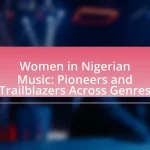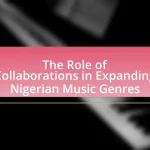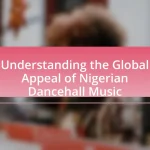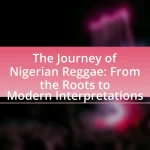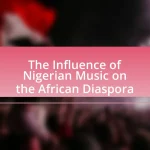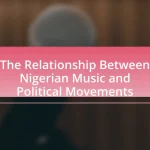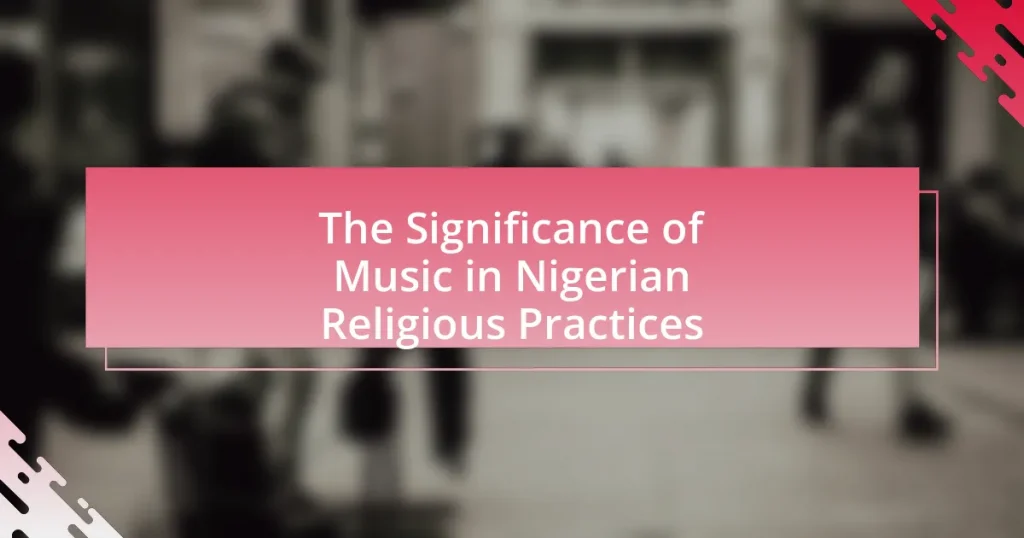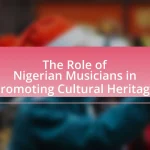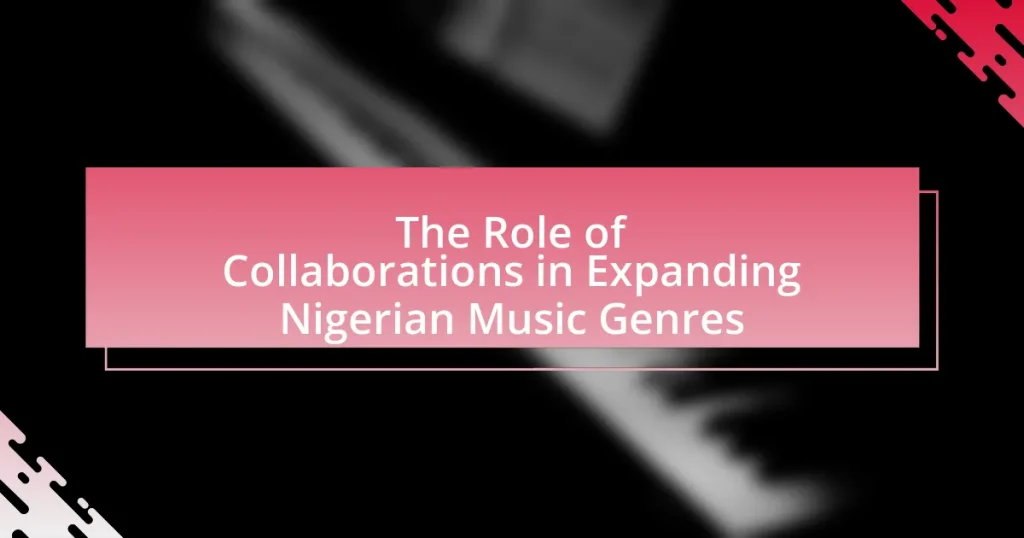The article examines the significance of music in Nigerian religious practices, highlighting its role as a medium for worship, communication with the divine, and cultural expression across various faiths, including Christianity, Islam, and indigenous beliefs. It discusses how music enhances spiritual experiences through hymns, chants, and traditional songs, fostering community cohesion and reinforcing cultural identity. The article also explores the types of music used in religious ceremonies, the historical roots of these practices, and the coexistence of traditional and contemporary music styles, emphasizing the importance of instruments and vocal styles in enriching worship experiences. Additionally, it addresses how music facilitates the transmission of religious beliefs and traditions to future generations.

What is the significance of music in Nigerian religious practices?
Music plays a crucial role in Nigerian religious practices by serving as a medium for worship, communication with the divine, and cultural expression. In various Nigerian religions, including Christianity, Islam, and indigenous beliefs, music enhances spiritual experiences through hymns, chants, and traditional songs that invoke the presence of deities or facilitate communal worship. For instance, in Yoruba religious practices, drumming and singing are integral to rituals, as they are believed to summon spiritual forces and ancestors. Additionally, studies show that music fosters community cohesion and identity among worshippers, reinforcing shared beliefs and cultural heritage.
How does music function within various Nigerian religious contexts?
Music functions as a vital component in various Nigerian religious contexts by facilitating worship, enhancing communal identity, and expressing spiritual beliefs. In traditional African religions, music is integral to rituals, serving as a medium for communication with the divine and ancestors, often accompanied by drumming and singing. For instance, the Yoruba religion employs music during ceremonies to invoke deities, with specific songs tailored to different gods, reflecting their attributes and stories.
In Christianity, gospel music plays a significant role in worship services, fostering a sense of community and spiritual upliftment among congregants. Research indicates that the incorporation of indigenous musical styles into church services enhances participation and emotional connection, as seen in the popularity of Nigerian gospel artists who blend traditional rhythms with contemporary Christian themes.
Similarly, in Islam, music is present in the form of devotional songs known as “nasheeds,” which are performed during religious gatherings and celebrations, reinforcing faith and community bonds. The use of music in these contexts not only enriches the spiritual experience but also preserves cultural heritage, demonstrating its multifaceted role in Nigerian religious practices.
What are the different types of music used in Nigerian religious ceremonies?
Nigerian religious ceremonies utilize various types of music, including traditional folk music, gospel music, and contemporary Christian music. Traditional folk music often incorporates indigenous instruments and rhythms, reflecting the cultural heritage of different ethnic groups, such as the Yoruba, Igbo, and Hausa. Gospel music, which has gained popularity in churches, blends African rhythms with Western musical styles, emphasizing themes of worship and praise. Contemporary Christian music, influenced by global trends, features modern instrumentation and production techniques, appealing to younger audiences. These musical forms play a crucial role in enhancing the spiritual experience and fostering community during religious gatherings.
How does music enhance the spiritual experience in Nigerian worship?
Music enhances the spiritual experience in Nigerian worship by facilitating emotional connection and communal participation. In Nigerian religious practices, music serves as a medium for expressing devotion, fostering unity among congregants, and creating an atmosphere conducive to spiritual engagement. For instance, traditional hymns and contemporary gospel songs often incorporate local languages and rhythms, which resonate deeply with worshippers, enhancing their sense of belonging and spiritual upliftment. Research indicates that music in worship can elevate emotional states, leading to a more profound spiritual experience, as evidenced by studies showing that congregational singing can increase feelings of community and shared faith.
Why is music considered a vital component of Nigerian religious identity?
Music is considered a vital component of Nigerian religious identity because it serves as a medium for spiritual expression and communal worship. In various Nigerian religions, including Christianity, Islam, and indigenous beliefs, music facilitates rituals, enhances the worship experience, and fosters a sense of belonging among participants. For instance, traditional Yoruba religious practices incorporate drumming and singing to invoke deities, while Christian congregations often use hymns and gospel music to convey messages of faith and unity. This integration of music into religious practices underscores its role in reinforcing cultural values and collective identity, making it an essential aspect of Nigeria’s diverse spiritual landscape.
How does music reflect cultural values and beliefs in Nigerian religions?
Music in Nigerian religions serves as a vital expression of cultural values and beliefs, embodying the spiritual and communal identity of various ethnic groups. It reflects the importance of rituals, storytelling, and oral traditions, which are central to religious practices. For instance, the use of drumming and chanting in ceremonies not only facilitates communication with deities but also reinforces social cohesion and cultural heritage among practitioners. Additionally, specific musical forms, such as the Yoruba “praise songs,” highlight the values of respect, gratitude, and communal unity, illustrating how music is intertwined with moral teachings and societal norms. This relationship between music and cultural values is evident in the way songs are composed to honor ancestors and celebrate life events, thereby reinforcing the belief systems that guide daily life in Nigerian communities.
What role does music play in community cohesion during religious events?
Music plays a crucial role in fostering community cohesion during religious events by enhancing collective identity and shared experiences among participants. In Nigerian religious practices, music serves as a medium for expressing faith, reinforcing social bonds, and facilitating communal participation. For instance, traditional hymns and chants often accompany rituals, creating a sense of unity and belonging among worshippers. Research indicates that communal singing during religious gatherings can increase feelings of togetherness and strengthen interpersonal relationships, as evidenced by studies showing that group music-making activities lead to higher levels of social cohesion and emotional connection among participants.
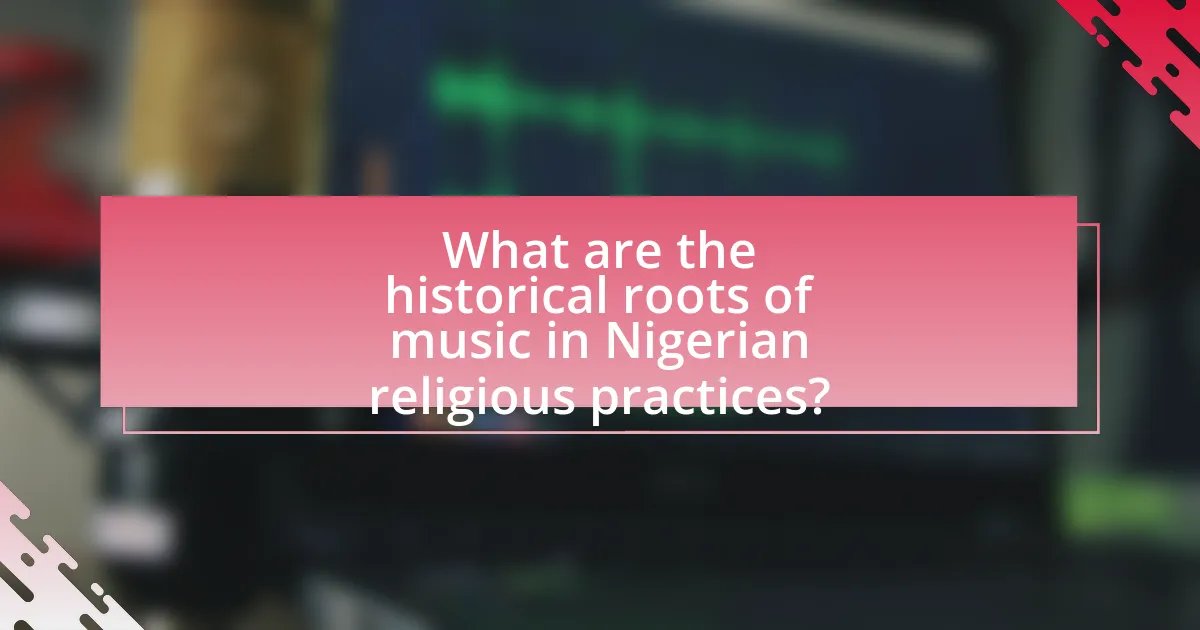
What are the historical roots of music in Nigerian religious practices?
The historical roots of music in Nigerian religious practices are deeply intertwined with the diverse ethnic cultures and spiritual beliefs of the country. Traditional Nigerian music has been used for centuries in rituals, ceremonies, and worship, reflecting the values and cosmologies of various communities. For instance, the Yoruba people incorporate music into their religious practices through drumming and singing during ceremonies honoring deities, which is documented in studies of Yoruba spirituality. Similarly, the Igbo culture employs music in their ancestral worship and festivals, emphasizing the connection between the living and the spiritual realm. These practices illustrate how music serves as a vital medium for communication with the divine and the ancestors, reinforcing social cohesion and cultural identity within Nigerian religious contexts.
How has the evolution of music influenced Nigerian religious traditions?
The evolution of music has significantly influenced Nigerian religious traditions by integrating diverse musical styles and instruments into worship practices. Traditional Nigerian music, characterized by its use of drums, chants, and melodies, has evolved to incorporate contemporary genres such as gospel, hip-hop, and highlife, which have reshaped the way religious messages are conveyed. For instance, the incorporation of modern instruments and rhythms in church services has made worship more engaging and accessible, attracting younger generations. This shift is evident in the rise of Nigerian gospel music, which blends traditional sounds with modern influences, thereby enhancing the spiritual experience and fostering community among worshippers. Additionally, the adaptation of music in religious contexts has facilitated the expression of cultural identity and spiritual beliefs, reinforcing the connection between music and faith in Nigerian society.
What historical events have shaped the musical landscape of Nigerian religions?
The introduction of Islam in the 11th century and the arrival of Christianity in the 15th century significantly shaped the musical landscape of Nigerian religions. These religions brought distinct musical traditions, instruments, and practices that integrated with indigenous beliefs. For instance, Islamic influence introduced the use of call to prayer and devotional songs, while Christian missionaries incorporated hymns and choral music into worship. Additionally, the transatlantic slave trade led to the fusion of African musical elements with European and American styles, creating new genres that reflect the spiritual experiences of enslaved Nigerians. These historical events collectively transformed the religious music scene, fostering a rich tapestry of sounds that continue to evolve in contemporary Nigerian religious practices.
How do traditional and contemporary music styles coexist in Nigerian worship?
Traditional and contemporary music styles coexist in Nigerian worship through a dynamic integration that reflects cultural heritage and modern influences. Traditional music, characterized by indigenous instruments and rhythms, is often used to enhance communal worship experiences and connect congregants to their cultural roots. Contemporary music, incorporating Western styles and technology, appeals to younger generations and fosters a sense of modernity in worship settings. This coexistence is evident in many Nigerian churches, where services blend traditional hymns with contemporary gospel songs, creating a rich tapestry of worship that resonates across different age groups and cultural backgrounds. The ability to adapt and incorporate various musical elements allows Nigerian worship to remain relevant and engaging, ensuring that both traditional and contemporary expressions are valued and celebrated.
What are the key instruments used in Nigerian religious music?
The key instruments used in Nigerian religious music include the talking drum, shekere, and the flute. The talking drum, known for its ability to mimic human speech, plays a crucial role in communication during ceremonies. The shekere, a gourd instrument covered with beads, adds rhythmic texture and is often used in worship settings. The flute, commonly made from wood or metal, contributes melodic lines that enhance spiritual experiences. These instruments are integral to various religious practices across Nigeria, reflecting the cultural diversity and spiritual significance of music in these contexts.
How do these instruments contribute to the overall worship experience?
Instruments contribute to the overall worship experience by enhancing emotional engagement and facilitating communal participation. The rhythmic and melodic elements produced by instruments like drums and flutes create an atmosphere conducive to spiritual connection, allowing worshippers to express their devotion more fully. Research indicates that music in religious settings can evoke strong emotional responses, which are essential for deepening the worship experience. For instance, a study published in the Journal of Psychology and Theology highlights that congregational singing, supported by instrumental accompaniment, significantly increases feelings of unity and spiritual upliftment among participants.
What is the significance of vocal styles in Nigerian religious music?
Vocal styles in Nigerian religious music are significant as they convey spiritual messages and enhance communal worship experiences. These styles, which include call-and-response patterns, improvisation, and the use of indigenous languages, facilitate active participation among congregants, fostering a sense of belonging and collective identity. For instance, the Yoruba tradition employs specific vocal techniques that reflect cultural heritage and religious beliefs, making the music not only a form of worship but also a means of preserving cultural narratives. Additionally, studies have shown that the emotional expressiveness of these vocal styles can evoke deep spiritual connections, reinforcing the role of music in religious practices across Nigeria.
How does music facilitate communication with the divine in Nigerian religions?
Music facilitates communication with the divine in Nigerian religions by serving as a medium for spiritual expression and connection. In various Nigerian religious practices, music is integral to rituals, ceremonies, and worship, allowing practitioners to invoke deities, ancestors, and spirits. For instance, traditional Yoruba religion employs drumming and singing to create an atmosphere conducive to spiritual presence, where rhythms and melodies are believed to attract divine attention. Additionally, research indicates that music enhances emotional engagement and communal bonding during religious events, further deepening the connection to the divine. This is evidenced by the use of specific musical forms, such as the “bata” drumming in Yoruba worship, which is designed to communicate sacred messages and facilitate divine interaction.
What are the spiritual meanings behind specific songs and chants?
Specific songs and chants in Nigerian religious practices often carry deep spiritual meanings that reflect cultural beliefs, rituals, and communal identity. For instance, the Yoruba chant “Oro” is believed to invoke ancestral spirits, facilitating communication between the living and the dead, which underscores the importance of ancestry in Yoruba spirituality. Similarly, the Igbo song “Ikenga” symbolizes personal strength and success, often performed during rites of passage to empower individuals. These songs and chants serve not only as a means of worship but also as a vehicle for storytelling, preserving history, and reinforcing social values within the community. The spiritual significance is further validated by ethnomusicological studies, such as those by researchers like John Blacking, who emphasize the role of music in expressing and shaping cultural identity and spiritual beliefs.
How do lyrics in religious music convey messages of faith and devotion?
Lyrics in religious music convey messages of faith and devotion by using specific themes, imagery, and language that resonate with the beliefs and values of the faith community. These lyrics often include references to divine attributes, sacred narratives, and communal experiences that reinforce the listener’s connection to their spirituality. For example, in Nigerian religious music, lyrics frequently highlight themes of worship, praise, and the power of prayer, which serve to inspire and uplift congregants. This is evidenced by the use of traditional proverbs and biblical verses that are familiar to the audience, making the messages more relatable and impactful. Additionally, the repetitive nature of certain phrases in these lyrics aids in memorization and encourages communal participation, further solidifying the messages of faith and devotion within the community.
What role does improvisation play in the expression of spirituality through music?
Improvisation serves as a vital mechanism for expressing spirituality through music, particularly in Nigerian religious practices. It allows musicians to convey personal and communal spiritual experiences in real-time, fostering a deep connection between the performer, the audience, and the divine. For instance, in traditional Nigerian music, improvisation often reflects the emotional state of the performer and the spiritual context of the moment, enabling a dynamic interaction that enhances the worship experience. This practice is supported by the fact that many Nigerian religious ceremonies incorporate spontaneous musical elements, which are believed to invoke spiritual presence and facilitate communication with the divine.
How can music be used as a tool for teaching and preserving religious beliefs?
Music serves as a vital tool for teaching and preserving religious beliefs by facilitating the transmission of spiritual narratives and values through lyrical content and communal participation. In Nigerian religious practices, songs often encapsulate theological concepts, historical events, and moral lessons, making them accessible and memorable for practitioners. For instance, traditional hymns and chants in various Nigerian faiths are used during rituals and ceremonies, reinforcing communal identity and shared beliefs. Research indicates that music enhances memory retention, which is crucial for passing down religious teachings across generations, thereby ensuring the continuity of faith practices.
What are effective methods for integrating music into religious education?
Effective methods for integrating music into religious education include incorporating traditional hymns and chants that reflect the cultural heritage of the community. This approach not only enhances engagement but also fosters a deeper understanding of religious teachings. For instance, using songs that convey biblical stories or moral lessons can aid memory retention and comprehension among learners. Research indicates that music can significantly improve cognitive functions related to learning, making it a valuable tool in educational settings. Additionally, involving students in music-making activities, such as singing or playing instruments, promotes active participation and strengthens community bonds within the religious context.
How does music help in passing down religious traditions to future generations?
Music serves as a vital medium for transmitting religious traditions to future generations by embedding cultural narratives and spiritual teachings within its structure. In Nigerian religious practices, songs often encapsulate historical events, moral lessons, and communal values, making them memorable and engaging for listeners. For instance, the use of traditional hymns and chants during rituals reinforces the teachings of faith and community identity, ensuring that these elements are retained and passed on. Research indicates that music enhances memory retention, which is crucial for the oral transmission of religious stories and practices, as seen in the work of scholars like John Blacking, who emphasized the role of music in cultural continuity. Thus, music not only preserves religious traditions but also fosters a sense of belonging and continuity among practitioners.
What practical tips can enhance the role of music in Nigerian religious practices?
Incorporating traditional instruments can enhance the role of music in Nigerian religious practices. Utilizing instruments such as the talking drum, shekere, and udu can create a culturally resonant sound that deepens the spiritual experience. Additionally, integrating local languages and dialects into hymns and chants fosters a sense of community and belonging among worshippers. Research indicates that music performed in native languages increases emotional engagement, making the worship experience more impactful. Furthermore, organizing workshops for musicians within religious communities can improve their skills and encourage collaboration, leading to more dynamic and meaningful musical expressions during services.
